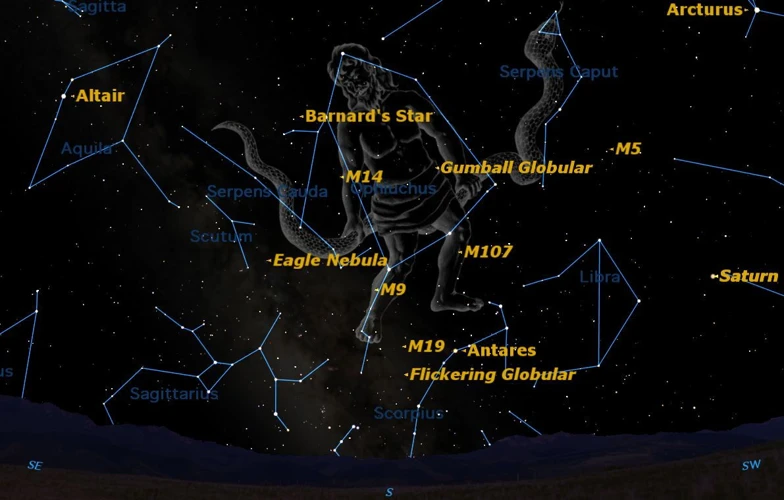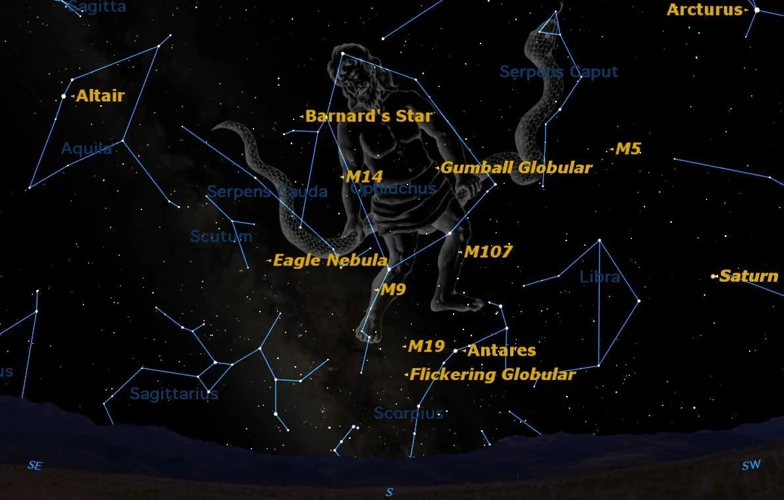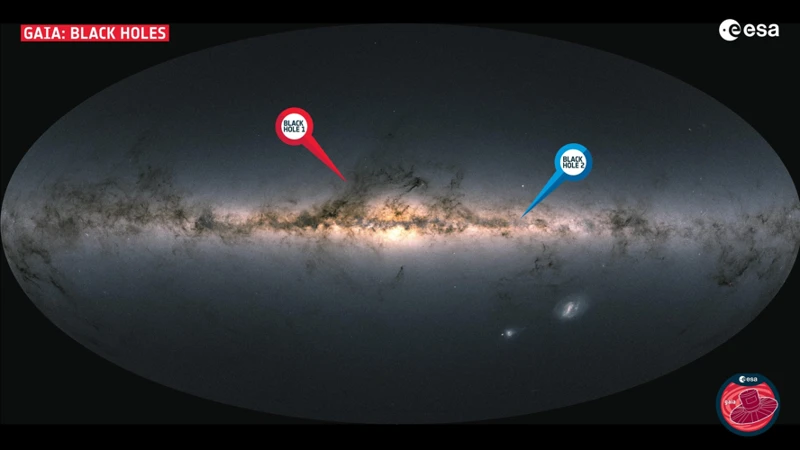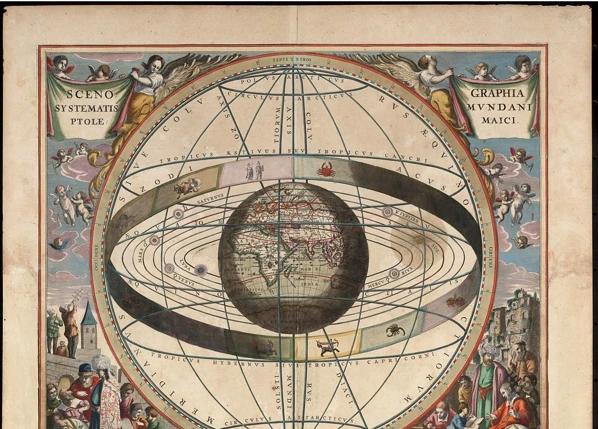For centuries, humanity has gazed up at the night sky, wondering about the vast expanse of the cosmos and the mysteries it holds. Two disciplines have emerged from this fascination: astronomy and astrology. While astronomy seeks to understand the physical and mathematical aspects of celestial bodies, astrology delves into the belief that these heavenly entities have a profound impact on human lives. The relationship between astronomy and astrology is complex, with both fields sharing some common ground while also differing in their focus, methodology, and purpose. In this article, we will explore the origins of astronomy and astrology, discover their distinct characteristics, and examine the ways in which they intersect and influence each other. So, let us embark on a journey to unravel the entwined relationship between these captivating realms of science and belief.
The Origins of Astronomy and Astrology

In delving into the origins of these captivating realms of science and belief, we uncover the intriguing beginnings of both astronomy and astrology. Astronomy can trace its roots back to ancient civilizations, where early astronomers made meticulous observations of the cosmos. They studied the movements of celestial bodies and sought to understand the patterns and cycles that governed the heavens above. Meanwhile, astrology emerged from the belief that the positions and movements of these celestial bodies held significance for human lives. It was believed that the planets, stars, and constellations influenced personality traits, relationships, and even the course of destiny. While astronomy has developed as a rigorous scientific discipline, grounded in empirical evidence and mathematical calculations, astrology has maintained its ties to spirituality and personal interpretation. These distinct beginnings set the stage for the fascinating relationship between the scientific endeavor of astronomy and the intricate world of astrology.
Astronomy: Ancient Observations of the Cosmos
Ancient observations of the cosmos form the foundation of the captivating discipline of astronomy. Throughout history, cultures worldwide have looked up at the night sky, marveling at the celestial bodies that adorned it. Early astronomers meticulously studied the movements of the stars, planets, and other celestial objects, seeking to understand the patterns and cycles that governed the heavens above. Ancient civilizations such as the Egyptians, Greeks, and Mayans developed impressive astronomical systems and made significant astronomical discoveries. They constructed observatories, such as the Great Pyramids of Giza, to track the movements of the stars and align their monuments with celestial events. Ancient astronomers also created detailed star charts and catalogs, mapping out the positions and trajectories of the heavenly bodies. These observations were not only scientific endeavors but also intertwined with religious and cultural practices. For instance, the ancient Egyptians associated certain stars with their gods and believed that the movements of the heavens influenced their daily lives and the afterlife. The ancient astronomers’ keen observations and meticulous recording of celestial phenomena paved the way for modern-day astronomy and further deepened our understanding of the vast cosmos.
Note: You can find more information about the impact of astrology on psychology in our article here.
Astrology: The Influence of Celestial Bodies on Human Lives
Astrology, as a field of study, revolves around the belief that celestial bodies such as the sun, moon, planets, and stars exert a profound influence on human lives. This influence is seen through the interpretation of astrological charts, which map out the positions of these celestial bodies at the time of a person’s birth. The positions of these bodies are believed to shape various aspects of an individual’s personality, behavior, and life events. Each celestial body is associated with certain traits and characteristics, and their alignments and interactions are thought to create unique energies that impact different aspects of life – including love, career, and personal growth. For instance, the sun is often associated with one’s core identity and vitality, the moon with emotions and intuition, and Venus with love and relationships. Astrologers interpret these celestial influences to provide insights, predictions, and guidance to individuals seeking a deeper understanding of themselves and their life path. While astrology’s claims lack empirical evidence and are not validated by the scientific method, it continues to captivate many individuals who find personal meaning and guidance in the ancient wisdom it offers. To understand astrology further and its various elements, one may explore the scientific analysis of astrological elements or delve into the scientific foundations of zodiac signs.
The Key Differences Between Astronomy and Astrology

When exploring the relationship between astronomy and astrology, it becomes crucial to understand the key differences that set these disciplines apart. The first significant difference lies in their focus and purpose. Astronomy is primarily concerned with the study of celestial bodies, their physical properties, and their interactions within the vast universe. Its objective is to unravel the mysteries of the cosmos through observation, experimentation, and mathematical modeling. In contrast, astrology is centered around the belief that these celestial bodies hold influence over human lives and personalities, providing insights into individual characteristics and potential paths. The second distinction stems from their methodology and scientific validity. Astronomy relies on scientific methods, rigorous data collection, and the application of established theories, making it a recognized scientific discipline. Alternatively, astrology relies heavily on interpretation, intuition, and subjective observations, leading to skepticism from the scientific community. Lastly, their scope and application differ significantly. Astronomy has a broad focus, exploring the entire universe and beyond, while astrology focuses on the relationships between celestial bodies and human existence. While these differences highlight the contrasting nature of astronomy and astrology, they also hint at the unique perspectives each field brings to our understanding of the universe and ourselves.
Focus and Purpose
When we examine the focus and purpose of astronomy and astrology, we uncover stark differences. Astronomy primarily concentrates on the study of celestial bodies, their movements, and the laws of the universe that govern them. The focus is on understanding the physical properties, compositions, and behaviors of planets, stars, galaxies, and other cosmic entities. Astronomers use telescopes and advanced technologies to observe and measure astronomical phenomena, collecting data for analysis and forming scientific theories. The central purpose of astronomy is to answer fundamental questions about the nature of the universe and expand our knowledge of the cosmos.
On the other hand, astrology shifts its focus towards the influence of celestial bodies on human lives and personal experiences. The purpose lies in interpreting and predicting the impact of these celestial entities on various aspects of human existence, such as personality traits, relationships, and life events. Astrologers analyze the positions of planets, stars, and other astrological elements at the time of an individual’s birth or in relation to ongoing planetary movements to make predictions and offer insights. The aim is to guide individuals, provide self-awareness, and offer potential paths for personal growth and fulfillment.
While astronomy directs its focus outward, exploring the vastness of the cosmos, astrology directs its focus inward, seeking to understand the intricate connections between celestial bodies and the human experience.
Methodology and Scientific Validity
In exploring the relationship between astronomy and astrology, one significant difference lies in their methodology and scientific validity. Astronomy, as a science, follows a rigorous methodology rooted in empirical evidence and verifiable observations. Astronomers use advanced tools and techniques such as telescopes, spectrographs, and space probes to carefully study celestial bodies and gather data. They rely on the principles of physics, mathematics, and other scientific disciplines to understand the physical properties, movements, and interactions of these celestial entities. The field of astronomy adheres to the scientific method, which involves making observations, formulating hypotheses, conducting experiments, and drawing conclusions based on empirical evidence. This commitment to scientific validity sets astronomy apart as a rigorous and objective discipline.
On the other hand, astrology employs a different approach to study celestial bodies. Its methodology is based on interpretations and correlations rather than empirical evidence. Astrologers analyze the positions and alignments of celestial bodies at the time of a person’s birth to create a birth chart or horoscope. They then interpret the symbols, aspects, and planetary influences within the chart to provide insights into a person’s personality traits, relationships, and life events. While astrology does rely on astronomical data for its calculations, the interpretations and predictions made are subjective and based on personal beliefs and traditions.
The differing methodologies of astronomy and astrology contribute to their distinct standing in the scientific community. Astronomy’s adherence to the scientific method and its ability to provide evidence-based explanations gives it a higher level of scientific validity. Astrology, on the other hand, is often considered a pseudoscience due to its reliance on subjective interpretations and lack of empirical evidence. However, it is important to note that astrology still holds cultural and historical significance for many individuals and continues to be practiced and studied in various forms.
The difference in methodology and scientific validity highlights the contrasting approaches taken by astronomy and astrology in their pursuit of understanding celestial bodies and their influence on human lives. While one focuses on scientific rigor and objective analysis, the other relies on symbolism, interpretation, and subjective belief systems.
Scope and Application
When it comes to scope and application, astronomy and astrology differ significantly. Astronomy, as a scientific discipline, focuses on studying the physical attributes and behavior of celestial objects, such as stars, galaxies, planets, and comets. Its scope extends beyond our solar system, exploring the vastness of the universe through telescopes, satellites, and space probes. With a strong foundation in physics, mathematics, and observations, astronomy contributes to our understanding of the cosmos and its evolution.
On the other hand, astrology’s scope centers on the influence of celestial bodies on human lives and events. Astrologers believe that the positions and movements of the planets and stars impact individual personalities, relationships, and even global events. The application of astrology is primarily associated with horoscopes, birth charts, and astrological consultations, where astrologers interpret celestial alignments to provide insights into various aspects of life, such as love, career, and personal development.
While astronomy has a broad scope that spans the entire cosmos, astrology’s focus is primarily on the relationship between celestial bodies and human existence. It delves into the belief that planetary configurations can provide guidance and understanding of individuals, societies, and historical events. Although their scopes diverge, both astronomy and astrology captivate the human imagination and continue to shape our understanding of the universe and our place within it.
The Common Ground

While astronomy and astrology may have different methodologies and purposes, they also share common ground that bridges the gap between these two intertwined disciplines. One significant area of convergence lies in the study of celestial bodies and their movements. Both astronomers and astrologers closely observe the positions, motions, and interactions of planets, stars, and other celestial entities. Astronomers meticulously map out the cosmos, exploring the physical properties and behaviors of these bodies. On the other hand, astrologers interpret these celestial movements and alignments, assigning symbolic meanings and making predictions about their influence on human lives. This shared foundation of studying the celestial realm forms a bridge between the worlds of astronomy and astrology and serves as a starting point for further exploration of their relationship. Additionally, both fields are deeply rooted in interpretation and symbolism. Astronomers analyze the behavior of celestial bodies, seeking patterns and connections that may reveal the nature of the universe. Similarly, astrologers interpret the placements of planets, signs, and houses, extracting symbolic significance and meaning from these configurations. This common focus on interpretation allows for a cross-pollination of ideas and approaches between astronomy and astrology, despite their differing methodologies and philosophies.
Studying Celestial Bodies and Their Movements
When studying celestial bodies and their movements, both astronomy and astrology share a common ground. However, their approaches and interpretations differ significantly.
In astronomy, scientists meticulously observe and analyze the physical characteristics of celestial bodies such as stars, planets, and galaxies. Through telescopic observations, they track the positions, orbits, and motions of these entities with precision and accuracy. Astronomers use mathematical models and advanced technologies to study the properties of celestial bodies, including their composition, size, temperature, and distance from Earth. This data-driven approach enables astronomers to make predictions and explain phenomena based on scientific principles and empirical evidence.
On the other hand, astrology focuses on the perceived influence of celestial bodies on human lives. Astrologers use a map of the sky, known as a birth chart or horoscope, to study the positions of celestial bodies at the time of a person’s birth. They interpret these positions to make predictions and provide insights into an individual’s personality traits, relationships, and life events. Astrology believes that the movements and alignments of celestial bodies can impact various aspects of human existence.
In essence, while both astronomy and astrology involve the study of celestial bodies and their movements, astronomy takes a scientific and empirical approach, whereas astrology leans towards symbolism and interpretation in making connections between celestial events and human experiences. Their contrasting methodologies have shaped these disciplines into distinct practices, creating a fascinating interplay between science and belief in the realm of celestial observations.
Interpretations and Symbolism
Interpretations and symbolism play a crucial role in both astronomy and astrology, although in different ways. In astronomy, interpretations are based on scientific principles and empirical evidence. Astronomers observe celestial phenomena, such as the movement of planets, the birth and death of stars, and the formation of galaxies, to gather data and derive meaningful explanations. They use mathematical models and advanced instruments to analyze these observations, uncovering the mysteries of the universe. Symbolism, on the other hand, is more prominent in astrology. Celestial bodies are associated with various symbols and archetypes, each representing different qualities and traits. For instance, the Sun often symbolizes vitality and individuality, while the Moon represents emotions and intuition. Astrologers interpret the positions and interactions of these celestial bodies to provide insights into personality traits, relationships, and life events. They draw upon ancient wisdom, mythologies, and esoteric teachings to assign meanings to these symbols. While interpretations in astronomy are based on objective analysis, interpretations in astrology involve subjective interpretation and personal belief systems. Nevertheless, both disciplines recognize the power of interpretations and symbolism, albeit in differing contexts.
The Influence of Astronomy on Astrology

Astronomy and astrology have a complex and intertwined relationship that is evident in the way astronomy influences the practice of astrology. Firstly, constellations and zodiac signs play a significant role in both disciplines. Astronomy identifies and studies the constellations, mapping their positions and movements in the sky. These constellations form the basis of the zodiac, which astrology utilizes to assign specific characteristics and meanings to individuals based on their birth dates. Secondly, planetary alignments and transits observed by astronomers provide astrologers with valuable information for making predictions and interpretations. Astrologers consider the alignment of planets and their motion in relation to the zodiac signs to assess how these influences may manifest in individuals’ lives. While astronomy provides the factual observations and data, astrology interprets and assigns symbolic meaning to these celestial phenomena, creating a bridge between science and belief.
Constellations and Zodiac Signs
In the realm of astrology, two key elements play a significant role: constellations and zodiac signs. Constellations are groups of stars that form recognizable patterns in the night sky. They have been observed and named by various cultures throughout history. These constellations serve as reference points for astrologers when making predictions or interpreting celestial influences. The zodiac signs, on the other hand, are twelve divisions of the celestial sphere that correspond to specific periods of the year. Each sign is associated with certain personality traits and characteristics. The zodiac signs are based on the positioning of the Earth in relation to the constellations during different times of the year. However, it is worth noting that due to the precession of the Earth’s axis, the alignment between the zodiac signs and their corresponding constellations has shifted over time. This phenomenon has sparked debates between astronomers and astrologers regarding the accuracy and relevance of the zodiac signs. While astronomers view the constellations as fixed and scientific entities, astrologers focus more on the symbolic interpretations and meanings associated with the zodiac signs.
Planetary Alignments and Transits
Planetary alignments and transits hold a significant place in both the realms of astronomy and astrology. In astronomy, the study of planetary alignments and transits allows scientists to better understand the mechanics of our solar system. These events occur when celestial bodies such as planets, moons, and asteroids line up in a specific configuration. Through careful observation and mathematical calculations, astronomers can predict and track these alignments, contributing to our knowledge of the universe.
In astrology, planetary alignments and transits play a different role. It is believed that the position and movement of celestial bodies at the time of a person’s birth can influence their personality traits and life events. Each planet is associated with different qualities and energies, and their alignments with each other and with the zodiac signs are seen as significant moments that can impact one’s life. Astrologers track and interpret these alignments, considering the angles formed between the planets and the impact they may have on an individual’s birth chart.
For example, a common transit that astrologers study is the retrograde motion of planets. When a planet appears to move backwards in its orbit from our perspective on Earth, it is said to be in retrograde. This phenomenon has different astrological interpretations depending on the planet involved. For instance, Mercury retrograde is often associated with communication and technology disruptions, while Saturn retrograde may signify a period of reassessment and inner reflection.
While astronomy approaches planetary alignments and transits from a scientific standpoint, astrology delves into their symbolic and interpretative aspects. Both fields acknowledge the existence of these celestial events, but they diverge in their interpretation and application. Whether viewed through the lens of scientific inquiry or subjective belief, planetary alignments and transits continue to fascinate and inspire exploration in both astronomy and astrology.
The Complex Relationship: Mutual Skepticism and Collaboration

The relationship between astronomy and astrology is marked by a complex interplay of mutual skepticism and collaboration. On one hand, astronomers, who adhere to the principles of scientific inquiry and empirical evidence, often criticize astrology for its lack of scientific validity and reliance on subjective interpretations. They argue that astrology’s predictions and claims are unfounded and devoid of scientific accuracy. However, amidst these differences, there have been instances where the two fields intersect and collaborate. Some astrologers have worked closely with astronomers to analyze astrological elements from a scientific perspective, attempting to find correlations and explanations rooted in astronomical phenomena. Conversely, astronomers have also acknowledged the significant historical contributions of astrology in areas such as calendar development and celestial mapping. This complex relationship continues to generate dialogue and debate, as both fields grapple with their differences while exploring avenues of possible collaboration.
Scientific Criticisms of Astrology
Scientific criticisms of astrology have been a topic of debate among scholars and scientists for many years. One of the main arguments against astrology is its lack of empirical evidence and scientific validity. Critics argue that astrological predictions and readings are often based on vague and generalized statements that can be applicable to a wide range of individuals. They consider astrology to be a pseudo-science, as it does not follow the rigorous methodology and principles of scientific inquiry. Another criticism is the lack of consistency and reproducibility in astrological predictions. Skeptics argue that if astrology were indeed a valid scientific practice, astrologers would be able to consistently predict future events or accurately describe personality traits. However, studies testing the accuracy of astrological predictions have shown no better results than chance. Critics also point out that astrology fails to take into account important factors such as genetics, environment, and individual choices, which have a significant impact on a person’s life. They argue that attributing outcomes solely to celestial bodies ignores the complexity of human behavior and reduces personal agency. The scientific criticisms of astrology highlight the need for empirical evidence and rigorous testing to validate its claims and establish it as a legitimate scientific discipline.
Scientific Contributions from Astrology
Scientific Contributions from Astrology:
While astrology is often viewed as a pseudoscience, it has made some intriguing contributions to scientific inquiry. One area where astrology has had an impact is in the development of psychology. The study of astrology has provided insights into the connection between celestial movements and human behavior. Through the analysis of astrological elements such as zodiac signs, planetary positions, and aspects, psychologists have gained a deeper understanding of personality traits, motivations, and the psychological makeup of individuals. By examining the correlations between astrological characteristics and psychological patterns, researchers have been able to uncover valuable insights into human nature and develop new frameworks for understanding personality.
In addition to psychology, astrology has also influenced fields such as sociology and anthropology. Astrology offers a unique lens through which to examine societal trends, cultural beliefs, and historical patterns. Astrologers have studied the impact of planetary alignments and celestial events on collective consciousness, social dynamics, and cultural shifts. By analyzing astrological charts and historical data, researchers have identified correlations between celestial events and significant societal changes. This has led to a deeper understanding of human society and its complex relationship with cosmic forces.
Astrology has provided inspiration and guidance for scientific research. Astronomers have sometimes turned to astrology to explore new avenues of inquiry and discover celestial phenomena. For example, the study of astrological cycles and planetary alignments has led astronomers to investigate certain patterns in celestial movements, which have resulted in the discovery of comets, asteroids, and other celestial objects. Additionally, astrology has served as a cultural touchstone for astronomers throughout history, shaping their observations, classifications, and interpretations of the night sky.
While astrology’s scientific contributions may not fit within the traditional framework of empirical science, they have fueled curiosity, sparked new ideas, and offered alternative perspectives for scientific exploration. By acknowledging and examining these contributions, we gain a more nuanced understanding of the complex relationship between astrology and the scientific endeavor.
Modern-day Applications
In the modern era, both astronomy and astrology continue to find diverse applications in different domains. The field of astronomy has greatly contributed to space exploration, with advancements in telescopes, satellites, and spacecraft enabling us to study distant galaxies, exoplanets, and cosmic phenomena. Astronomical research has provided valuable insights into the origins of the universe and has practical implications for understanding our own planet and the search for extraterrestrial life. On the other hand, astrology finds its place in personal guidance and self-awareness. Many individuals turn to astrology for insights into their personalities, relationships, and life events. Astrological readings and horoscopes offer interpretations and advice based on the positions of celestial bodies at the time of birth. While astronomy is firmly grounded in scientific principles, astrology serves as a tool for introspection and reflection. Both fields, while distinct in their approaches, captivate our fascination with the cosmos and the human experience.
Astronomy in Space Exploration
Astronomy plays a crucial role in the field of space exploration. Scientists and engineers rely on astronomical observations and data to chart the reaches of the universe and gain a better understanding of distant celestial objects. Telescopes, both on Earth and in space, allow astronomers to observe galaxies, stars, and other cosmic phenomena with unprecedented clarity. By studying the composition, behavior, and evolution of celestial bodies, astronomers can gather valuable information that shapes our understanding of the cosmos and informs future missions. For example, through spectroscopy, astronomers can analyze the light emitted or absorbed by celestial objects, revealing their chemical composition and providing insights into their formation and development. This knowledge is invaluable in planning exploratory missions to celestial bodies such as planets, moons, and asteroids. Astronomy also aids in the identification of potential targets for robotic probes and manned missions, contributing to the advancement of space exploration. By exploring the vastness of space, astronomers not only expand our knowledge but also pave the way for humanity’s future journeys beyond Earth’s boundaries.
Astrology in Personal Guidance and Self-awareness
Astrology plays a significant role in personal guidance and self-awareness. Many individuals turn to astrology as a tool for understanding themselves, their strengths, and their weaknesses. By analyzing their natal charts, which showcase the positions of celestial bodies at the time of their birth, individuals can gain insights into their personality traits and behavioral patterns. Astrology provides a language and framework to identify and explore different aspects of one’s life, including relationships, career, and personal growth. It offers a unique perspective on life events and can provide guidance during challenging times. For example, during a Saturn return, which occurs approximately every 29 years, individuals may experience major life transitions and reflect on their past choices. Astrology can offer explanations and support during such periods of self-reflection. Additionally, astrology can aid in understanding compatibility with others through synastry charts, which compare the positions of celestial bodies between two individuals. This helps individuals navigate relationships and gain insights into their dynamics. By delving into the intricacies of astrology, people can develop a deeper understanding of themselves and make more informed choices, ultimately leading to personal growth and self-awareness.
Conclusion
When examining the intricate relationship between astronomy and astrology, it is clear that these two disciplines have developed along divergent paths. While astronomy focuses on scientific observation and understanding of the universe, astrology centers around the belief in the influence of celestial bodies on human lives. Despite their differences, there are areas where these disciplines intersect, such as the study of celestial bodies and their movements. Both astronomers and astrologers study the positions and patterns of stars, planets, and constellations, although with different goals and methodologies. Interpretation plays a significant role in both fields, as symbolism and meaning are assigned to celestial phenomena.
Astronomy has influenced astrology in distinct ways, particularly in the development of constellations and zodiac signs. The observation of specific arrangements of stars led to the creation of constellations, which were later associated with zodiac signs in astrology. Additionally, planetary alignments and transits, which are carefully observed by astronomers, are considered significant events in astrology, affecting the interpretation of horoscopes and the predictions made for individuals.
While there is some scientific skepticism towards astrology, it has made contributions in terms of providing comfort, guidance, and self-awareness to individuals seeking personal insight through horoscopes. It has also raised intriguing questions about the potential impact of celestial bodies on human behavior and psychology. In contrast, astronomy has advanced as a science, making significant contributions to our understanding of the universe, space exploration, and the development of technologies like telescopes and satellites.
In conclusion, while they are distinct fields with different purposes, methodologies, and levels of scientific validation, astronomy and astrology share a common fascination with the cosmos and its influence on human lives. Whether one chooses to explore the vastness of the universe through the lens of scientific inquiry or find meaning and guidance through astrological interpretations, each discipline offers unique perspectives and contributes to our understanding of the interconnectedness between celestial bodies and our own existence. By appreciating the complexities and rich history of both astronomy and astrology, we can gain a deeper appreciation for the wonders of the universe and our place within it.
Frequently Asked Questions
What is the difference between astronomy and astrology?
Astronomy is a scientific discipline that focuses on studying celestial objects, their movements, and the physical laws that govern the universe. Astrology, on the other hand, is a belief system that suggests celestial bodies have an influence on human behavior and destiny.
How did ancient civilizations contribute to the development of astronomy and astrology?
Ancient civilizations made significant contributions to both fields. They observed celestial movements, developed early calendars based on astronomical events, and recorded celestial phenomena. These observations laid the foundation for astronomical calculations and also influenced astrological beliefs.
Are astrology and astronomy considered scientific disciplines?
Astronomy is widely regarded as a scientific discipline due to its focus on empirical evidence, observation, and mathematical calculations. Astrology, however, is considered a pseudoscience, as it lacks scientific validity and cannot be tested or proven through traditional scientific methods.
Can astrology predict future events?
While astrology suggests that celestial bodies can influence human lives, the ability to predict future events is not scientifically supported. Astrology relies on individual interpretation and subjective analysis rather than empirical evidence.
How do astronomy and astrology intersect?
Astronomy and astrology intersect in their study of celestial objects and their movements. Astronomical data, such as the positions of planets and stars, provide the basis for astrological interpretations and predictions.
What are zodiac signs in astrology based on?
Zodiac signs in astrology are based on the division of the ecliptic into twelve equal parts, with each part representing a specific constellation. These constellations were identified by ancient astronomers and named after mythological figures.
Can astrology be used for guidance in personal and emotional matters?
Astrology is often used as a tool for self-reflection and personal guidance. Many individuals turn to astrology to gain insights into their emotions, relationships, and personal growth. However, it is important to approach astrology with a critical mindset and recognize its limitations.
Do astronomers believe in astrology?
While some astronomers may have personal beliefs in astrology, as a scientific discipline, astronomy does not support or endorse astrological beliefs. Astronomers focus on studying the physical and mathematical aspects of the universe rather than the influences of celestial bodies on human lives.
Has astrology contributed to any scientific discoveries or advancements?
Astrology has not made significant contributions to scientific discoveries in terms of empirical evidence or scientific method. However, astrological concepts and symbolism have influenced ancient and cultural beliefs, contributing to the development of human psychology and mythology.
How has astronomy impacted space exploration?
Astronomy has played a crucial role in space exploration. Astronomical observations and calculations have helped scientists understand the nature of celestial objects, determine the feasibility of space missions, and guide spacecraft to their destinations. Astronomy continues to provide valuable insights for exploring the vast expanse of the cosmos.








